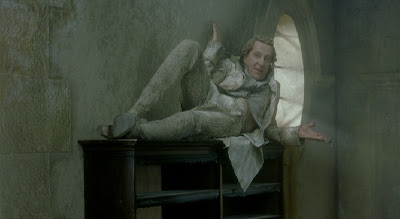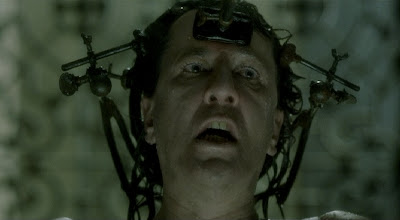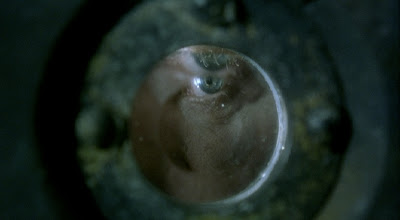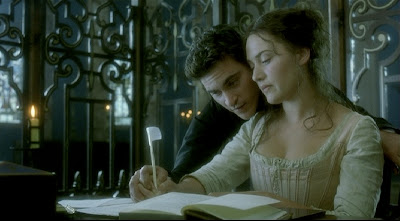
I owe a lot to this movie. I think it is partially responsible for shaping my taste, and helping me to realize my devotion to more deranged cinema. At the very least, it helped me realize my love of cinema that is not merely escapism, and is, in fact, too gut-wrenching and disturbing to ever be considered as such. I'm not sure I could say what made me adore this movie so much when I first saw it, which was just a little after it came out in 2000 (this would put me at about age 12 or 13). Partly, it could be the way it moves so seamlessly from the satirical into the disturbing--so smoothly that you aren't sure what happened. Now, I have seen the film so many times that it is almost more difficult to pick it apart, as I do whenever I watch a film now. Quills made a big critical splash at the time and is part of Philip Kaufman's rather impressive oeuvre, alongside his remake of Invasion of the Body Snatchers and The Unbearable Lightness of Being.

Quills is essentially a parable about self-expression, both artistic and sexual. And every film about art usually has a confluence of the two (is art possible without sex? Is sex possible without art? Is art sex? Is sex art? Would my parents have allowed me to rent this if they actually knew what it was about?) Nearly every exchange in the movie is sexualized in some aspect; every conversation is a power-play. This is, after all, a film about the origins of sado-masochism. Madeleine (Kate Winslet, who always rules) is a laundry-maid in a mad-house, caught between two men who are completely polarized in their attributes. The Marquis de Sade (Geoffrey Rush, who usually rules) is as full of perversions as the stories he is illegally publishing from within his mad-house prison. The Abbe (Joaquin Phoenix, who is okay when he is not Johnny Cash) is pious, virtuous, and gentle, and practically effeminate as a result. He oversees the asylum residents, attempting to use varying sorts of humane therapy (painting, theatre, choir) to keep them in check. The characters abide in a subtle balance until the entrance of Dr. Royer-Collard (Michael Caine) whose reactionary methods unleash a tidal wave of suck.
 Sort of reminiscent of this seminal image, no?
Sort of reminiscent of this seminal image, no?
Long story short: Abbe's repressed sexuality eventually drives him insane, putting him into the same cell that the Marquis had previously occupied. Despite the myriad disgusting fantasies pulsing through his mind, the Marquis is, seemingly, more aroused by the process of putting them to paper. His most poignant sexual act is writing, just as Madeleine's is reading. Both sex and art are complementary functions of human individuality. Neither can be repressed without egregious results like insanity or death, at least, if you happen to live in an insane asylum in Revolutionary Era France.


Naturally, there is a lot of voyeurism as well, which brings to mind the scopophilia of cinema in general. According to Freud, scopophilia is already an erotic tendency, a fundamental part of human sexuality. Particularly when a large part of the subject matter of the film is already related to sexuality, the look becomes even more eroticized. Whether or not Kaufman is intentionally bringing this out, it remains in the subtext. There are many close-ups on key-holes and watching through holes in the wall. In one particular scene, Abbe and Royer-Collard watch the Marquis through a rectangular window in his door, while he carries on as if he is an actor caught in the middle of a screen-performance. Coincidentally, he is rehearsing the theatre group. We, as an audience, witness the many sexual scenes, unfolding in a hermetic world that is unknowing of our presence. We are made voyeurs over and over.

Upon being confronted about leaking the de Sade's manuscripts to the publisher, Madeleine describes how she placed herself in the stories, allowing herself to play out her fantasies. This moment is descriptive of human interaction with any narrative art-form, cinema included. To put oneself into a narrative is almost a sexual act in itself, as reader and writer intermingle to create something new--an experience that is unique to the reader (or viewer). Certainly, being able to enter this world for a few hours is transportative, exactly the way cinema should be.

Slip it through my tiny hole!
ReplyDelete